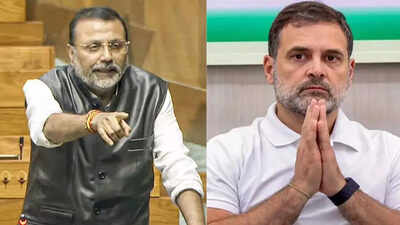
NEW DELHI: BJP MP Nishikant Dubey on Monday intensified his criticism of Congress leader Rahul Gandhi, calling for a probe into the alleged historic links between the Nehru-Gandhi family and China. His demand stemmed from what he described as “revelations” found in declassified documents from the 1961 Belgrade Summit of the Non-Aligned Movement (NAM). In a sharply worded X post shared on Monday, Dubey took aim at India’s first Prime Minister, Jawaharlal Nehru, questioning his foreign policy choices during the formative years of the Cold War. “Rahul Baba, do you know that at China’s behest, your family’s patriarch Nehru ji created the new gimmick of non-aligned countries? Look at the member countries of the first conference in Belgrade in 1961. After isolating India from both Russia and America, did any country come to India’s defence during or after the 1962 war with China?” Dubey asked.The BJP MP went on to allege that the Non-Aligned Movement (NAM), championed by Nehru, eventually “benefited” China rather than serving India’s strategic interests. Citing the 26th declaration adopted at the Belgrade Summit, Dubey argued that the text revealed Nehru’s alignment with Chinese interests. “Tibet to China, Panchsheel for China, and after making China a permanent member of the United Nations, this conference ordered the UN to recognise China as the sole representative state. By siding with China, did your family impose the 1962 war on India or not?” he said. He followed up with a pointed query directed at Rahul Gandhi: “Should the relationship between China and the Nehru family be investigated?” The 1961 Belgrade Summit was the inaugural meeting of the Non-Aligned Movement — a coalition of states aiming to stay independent from both the Western and Soviet power blocs. Nehru was a key architect in shaping the principles and objectives of the movement. This is not the first time Dubey has targeted the Congress leadership. He previously accused the Nehru-Gandhi family of compromising India’s interests in relation to Pakistan, particularly citing the Indus Waters Treaty. He had also flagged India’s financial commitments to Pakistan under the treaty, claiming they were the result of Congress-era policies that weakened India diplomatically.














